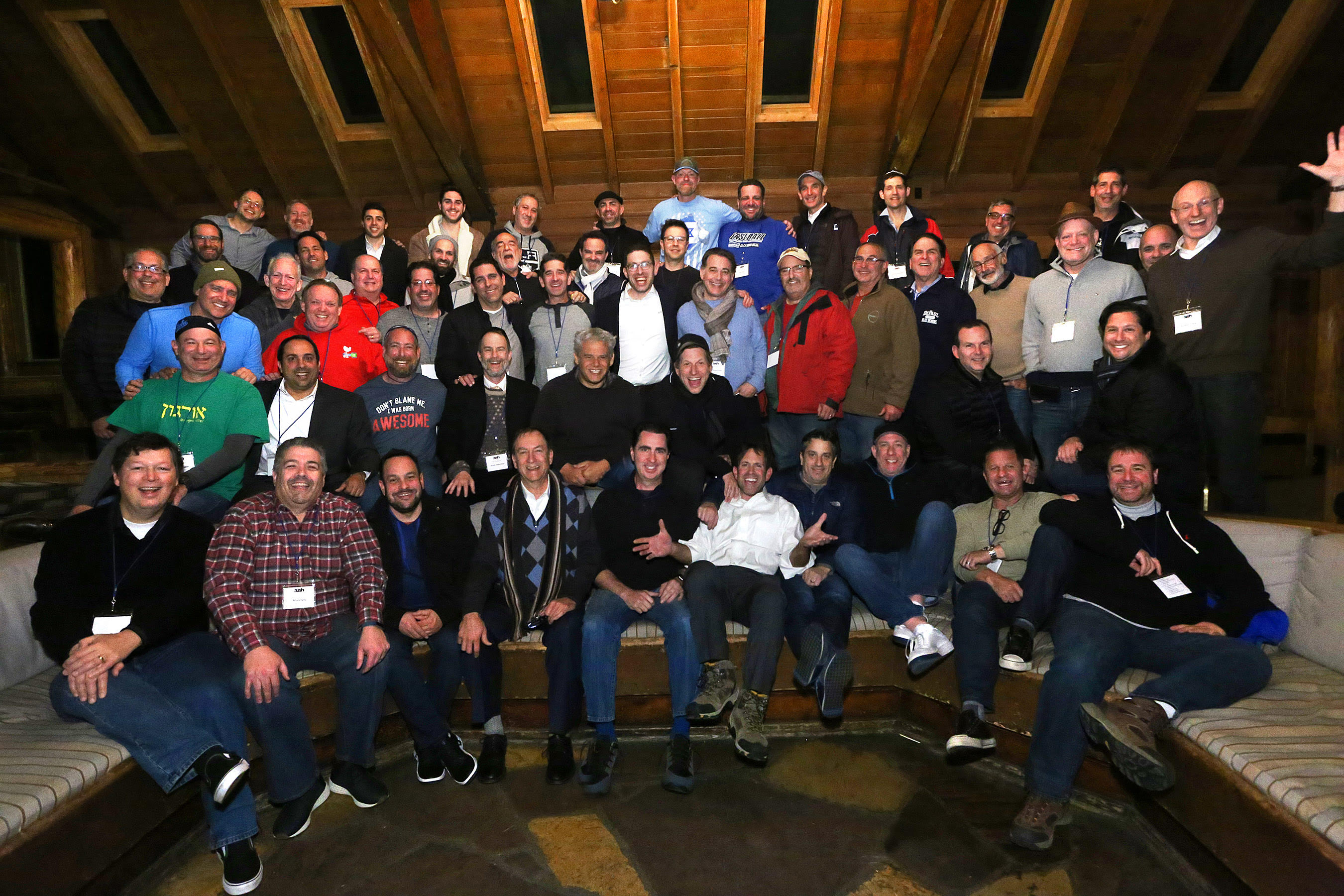 Author (far right) and friends on the 2018 AishLA/JMI Men’s Retreat in Running Springs, CA. Photo by Jonah Light Photography
Author (far right) and friends on the 2018 AishLA/JMI Men’s Retreat in Running Springs, CA. Photo by Jonah Light Photography I try to call my dad every day after I drop off the kids at school, a good way to fulfill the Fifth Commandment. I mention I’m going on a men’s trip for the weekend.
“No wives?”
“No, it’s a men’s trip with the same guys I went to Israel with in 2014. Plus fellas from the 2015, ’16, and ’17 trips.”
“And it’s Orthodox, so women aren’t allowed to participate.”
“Orthodox Judaism has women in it, Dad. This is a men’s trip for the same reason our wives take women’s trips. Some things serve the family best by happening separately.”
“Hmph.”
My father’s skepticism is not surprising. Modern secular culture promotes segregated “safe spaces” only for women and certain minorities. Not straight, white guys. Like many liberal Jews, my father believes that Orthodox Judaism is a sexist patriarchy.
Yet this trip for men was created by women. It began as a subsidized women’s trip to Israel organized by Lori Palatnik and her colleagues at the Jewish Women’s Renaissance Project, and Aish HaTorah, a Jewish outreach organization. Featuring immersion in Jewish practice, sisterhood and reconnection with one’s Source while visiting the Holy Land, the trip came to be nicknamed Birthright for Mommies.
We connected with ourselves as children of God, as Jews, spouses, friends and citizens.
Participants were re-energized as Jewish women, wives and mothers. Observance increased, but few became Orthodox. Rather, they brought key mitzvahs into the home, such as candlelighting and Shabbos dinner, and transformed the lives of their families by elevating the role of gratitude in the home.
Because they wanted the same experience for their husbands, the men’s trip was born.
My wife, Nina, and I participated in the trips in 2014 with Aish LA. Although we were already more observant than most of our travel companions, the experience was transformative. We connected with ourselves as children of God, as Jews, spouses, friends and citizens.
And I made lifelong friendships with guys I’d never met before. These things happened because we found ourselves in an unfamiliar space: the company of guys at the same stage of life, facing similar challenges in our families, in our careers and in our bodies.
It felt safe to open up to one another, sharing the failures of our pasts and profound fears about our futures. We learned we’re not alone in these journeys, and we shared the wisdom of hard-won experience. We were also blessed with great teachers and leaders. My trip was led by Charlie Harary, others by Saul Blinkoff. Both men were coming on the reunion trip to the mountains.
Nina said, “I would never begrudge you a men’s trip because I love the sisterhood of women-only events. I also like who you are when you return.”
Less than two hours from L.A., we found ourselves in the snow. Charlie opened by explaining a property of the human brain, neuroplasticity. This means that consistent repetition of thought patterns creates new neural pathways. When we learn a new language, for example, we actually alter the structure of our brains.
Thus, to become that better man we all want to be, we need to start thinking, speaking and acting like him. And in order to figure out who that guy is, we need to understand that life must be about service. The great paradox of the world is that one who negates himself for the sake of others will be empowered. One who strives for himself, however, will never become a great man.
Saul followed by sharing what the Torah says about males and females. Eve was created as an azer kenegdo to Adam, an “opposing helpmate.” When our wives oppose us, it can be irritating, even infuriating. But what if they’re actually doing their job? What if their opposition is crucial to us becoming that better man? Women know all too well the value of peace, yet they speak up for our own good. Think how much more peace there would be in the home if we just listened to the rebuke and then reflected on it. We might even figure out how to act on it.
I was invited to share my Accidental Talmudist story because it touches on the life of the soul, Torah learning, and the generational connection between our parents and our children.
Then we sang together like warriors, holding nothing back, and we charged each other to bring this fire back from the mountain.
Learn more about Sal Litvak’s Accidental Talmudist story, and join his followers at accidentaltalmudist.org.






















 More news and opinions than at a Shabbat dinner, right in your inbox.
More news and opinions than at a Shabbat dinner, right in your inbox.